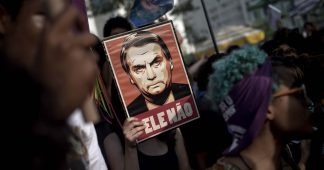By Franklin Frederick
The Russian Revolution in 1917 panicked Europe’s upper middle classes, already much discredited and weakened by the gigantic tragedy of the First World War, the result of their own greed, irresponsibility and incompetence. The crash of 1929, which almost ruined most of the industrialized capitalist countries but hardly affected the young Soviet Union, further strengthened the alternative posed by the Russian Revolution. This bourgeoisie subsequently faced two huge tasks: rebuild the international capitalist order and respond to the challenge posed by Marxist criticism and the Russian Revolution. A group of intellectuals hostile to communism, to the left in general, and even to New Deal capitalism in the U.S., sought to develop and impose a more authoritarian and profoundly anti-democratic reconstruction of capitalism: neoliberalism. As mentioned in a previous article, Switzerland was the first country to welcome and finance these intellectuals, playing a key role in shaping the neoliberal order.
Quinn Slobodian, author of Globalists, gave a name to Switzerland’s contribution to neoliberalism: the Geneva School.
For Slobodian:
“The Geneva School includes: thinkers who held academic positions in Geneva, among whom Wilhelm Röpke, Ludwig von Mises, and Michael Heilperin; those who pursued or presented key research there, including Friedrich Hayek, Lionel Robbins, and Gottfried Haberler; and those who worked at the secretariat of the General Agreement on Tariffs and Trade (GATT), such as Jan Tumlir and Frieder Roessler. Geneva School neoliberals transposed the ordoliberal idea of ‘the economic constitution’ – or the totality of rules governing economic life – to a scale beyond the nation.”
Still according to this author;
“Geneva – later the home of the WTO – became the spiritual capital of the group of thinkers who sought to solve the riddle of postimperial order “– the period following the end of the Austro-Hungarian Empire – that obviously included the challenge posed by the Russian Revolution. Slobodian added:
“What the neoliberals of the Geneva School sought was not a partial but a complete protection of the rights of private capital, and the ability of supranational judiciary bodies like the European Court of Justice and the WTO to override national legislation that might disrupt the global rights of capital”, in short, an economic constitution for the world.
For the Geneva School, always according to Slobodian:
“Commitments to national sovereignty and autonomy were dangerous if taken seriously. The Geneva School stalwarts thus believed that after empire, nations must remain embedded in an international institutional order that safeguarded capital and protected their right to move it freely throughout the world. The cardinal sin of the twentieth century was unfettered national independence, and the neoliberal world order required enforceable isonomy – or “same laws”, as Hayek would later call it – against the illusion of autonomy, or “own laws”.”
Put another way, for neoliberals in the Geneva School, laws defending the ‘rights’ of capital should overlap with national laws concerning workers’ rights or environmental protection, for example.
Many of the Geneva School’s participants were among the founders of the Mont Pélerin Society in Switzerland, an organization that played a key role in the intellectual construction of neoliberalism and the international dissemination of its proposals. The Mont Pélerin Society has served as an inspiration and model for other important organizations on the international right such as the Atlas Network and the Atlantic Council.
Faced with the challenge posed by the Russian Revolution, the Swiss bourgeoisie very early on sided with capital, embracing even the most authoritarian extremes of capitalism as represented by neoliberalism, all to stop the ever more threatening ‘danger’ of the left, always much more menacing, from the point of view of capital, than any totalitarian threat from the right. An important testimony of the Swiss bourgeoisie’s crusade against communism and the left in general is given by the writings of Harry Gmür, Swiss writer and communist. Born in Bern in 1908, Gmür witnessed the rise of fascism in Europe and the neo-liberal reaction in Switzerland, both reactions to the challenge posed by workers and the Russian Revolution. Unlike many of his contemporaries, Gmür embraced the left and its humanitarian values. In a text published in 1965 under the title Hitler’s War and Switzerland, Gmür wrote: “After the outbreak of war, the government in Bern, under German pressure, but certainly availing itself all too readily of the opportunity, had hastened to ban and subject to police surveillance all consistently anti-fascist parties, associations, newspapers, book distributors, and so on.”
And in another article published in 1975 – At that time in Switzerland – Gmür wrote:
“The Swiss Left was subjected to particular pressure during the war…After the outbreak of the war, the Federal Council, out of anti-Communism no less than out of servility to the Third Reich, had suppressed Freiheit, the organ of the Communist Party, and the two daily newspapers of the Left Socialists of Vaud and Geneva, which had split from Social Democracy. After the French surrender, the Communist Party, the left socialist parties of French-speaking Switzerland, the German-Swiss Socialist Party Opposition (a faction working against the right-wing course of the party leadership) and the Switzerland-Soviet Union Society were banned outright. Their property – printers, bookshops, even office inventory – was confiscated and never returned even later.
Justifiable complaints by the Soviet press about the treatment of Soviet prisoners of war who had fled to Switzerland were rejected by the chief of justice and police.”
Gmür’s two articles were published in Weltbühne, a publication in the former Democratic Republic of Germany, under the pseudonym of Stefan Miller, certainly to avoid repression from the right wing in Switzerland.
However, the most compelling document about Switzerland’s bourgeoisie, its ceaseless war against the left and its uncompromising defence of capital above all else is the Bergier Report.
In December 1996, an independent commission was created by the Swiss Federal Council under the direction of the historian Jean François Bergier, with the mandate, according to Bergier himself:
“ to answer a series of specific questions: on “unclaimed” assets, i.e. assets deposited in Swiss banks before the (Second World) War by future victims (of Nazism) and never later recovered by them or their heirs; on the treatment of refugees; on all economic and financial relations between Switzerland and nazi Germany – trade, industrial production, credit and capital movements, insurance, arms trafficking, the market in art works and property looted or sold by force, rail transit, electricity, forced labour in the German subsidiaries of Swiss companies.”
The Bergier Report as a whole consists of 11,000 pages distributed over 28 volumes. It is an immense and invaluable piece of work.
For Pietro Boschetti, author of a book that summarizes the Bergier Report titled Les Suisses et les Nazis [The Swiss and the Nazis], from which Bergier’s previous quote comes,
“the report in general confirmed what historians already knew: yes, asylum policy was extremely harsh during the war; yes, the National Bank bought a lot of suspicious gold from Nazi Germany, thus providing it with a much-appreciated service.”
In his book, Boschetti mentions a few examples of the cooperation of big business in Switzerland with nazi Germany as revealed by the Bergier Report. From the examples given by Boschetti, I mention some below, to give an idea of the scope of the Bergier Report.
On business between Switzerland and nazi Germany, Boschetti wrote: “Relationships between businessmen were obviously very close and lasting. Thus, after the war, the president of the [Bank] SBS [Rudolf Speich] and the director of the [Bank] UBS [Alfred Schaefer] supported the only Nazi banker [Karl Rasche, member of the SS, of Dresdner Bank] before the International Tribunal in Nuremberg.”
On ‘aryanisation’: “Aryanity certificates to prove racial purity appear to have been a fairly common practice. For example, in order to obtain the right to land in Munich, Swissair accepted that its crews prove their aryanity. Nestlé did the same, as did insurance companies.”
And again, about Nestlé: “From Vevey, Nestlé remained in contact throughout the war with the Swiss Hans Riggenbach, who was in charge of the multinational’s German operations in Berlin. Nestlé sold its Nescafé to the Wehrmacht during the Russian campaign, despite the difficult of importing of coffee beans.”
On forced labour by prisoners of war: “‘Struck, like their competitors, by the lack of workers, Swiss firms resort to forced labour. …at the Lonza factories in Waldshut, where 150 Frenchmen landed between July 1940 and April 1942. From then until the end of the conflict, more than 400 Russian prisoners of war worked there. Georg Fischer, BBC, Maggi, Nestlé and many others did not hesitate to draw on this pool of labour.”
“Ill-treatment was commonplace, including in the Swiss subsidiaries… Until August 1944, Switzerland repatriated fleeing forced labourers, especially Russians and Poles, to Germany.”
For Bergier, the authorities and the people responsible for Swiss companies at the time, “did not fail to justify each of the measures they took, or their refusal to take them, or their hesitation. But their explanations rarely stand up to scrutiny”, as he wrote in the introduction to Boschetti’s book.
However, the public debate that should have taken place after the Report was published – the ultimate goal of all the effort employed – was thwarted. In the words of Pietro Boschetti:
Curious country all the same! While it has just completed a praiseworthy work of historical introspection recognised almost everywhere as exemplary, while it has invested considerable resources to enable historians to work seriously and independently, while it has gone through an ‘identity crisis’ caused by the scandal of unclaimed assets which gave rise to all sorts of exaggerations and excesses, this country, at a time when it has the historical material necessary to have a serene debate, refuses to hold it…. What a pity!
The suppression of this debate was a fundamental victory for the bourgeoisie and big business in their endeavour to protect their own image and maintain within Switzerland the space and credibility needed to continue the expansion of the neoliberal agenda. Were it not for this, institutions as different as the World Economic Forum and the World Wide Fund for Nature (WWF), both based in Switzerland and both heirs and proponents of the neoliberal vision of the world, i.e., the market as the main instrument for organizing society and even the ‘saviour’ of the planet, might not have achieved such renown.
2022 marks the 20th anniversary of the publication of the Bergier Report. It is an occasion to hold the suppressed but still necessary discussion about this document, not only for a deeper understanding of the role of the Swiss bourgeoisie and big business and their ideology at the time of the Second World War, but above all to understand current developments. After all, the neoliberal world view and its representatives still hold enormous political power in this country, hostility against the left remains as aggressive as it was during the Cold War, and Switzerland continues to be an important partner in the construction and dissemination of the fake U.S. narratives supporting anti-democratic campaigns against Cuba and Venezuela, to cite just these two examples. The political forces and economic interests that led to the collaboration of large Swiss companies with nazi Germany are the same as those behind the proposals to reorganize the state according to the interests of capital as advocated by the Mont Pélerin Society and the World Economic Forum; they are also the same forces that prevented public discussion of the Bergier Report.
Neoliberal capitalism continues to be advanced in Switzerland as the only possible solution to the various problems facing humanity today, from the ecological crisis to the health crisis represented by the pandemic. The role of neoliberal capitalism as the cause of these same problems is never even mentioned. When the climate movement dared to question neoliberalism in Switzerland, the reaction was brutal and repressive legislation. Despite the Mont Pélerin Society and the Geneva School, the World Economic Forum and the WWF, there is another tradition in Switzerland, one that was embodied in Harry Gmür, in the Bergier Commission and is now reappearing in the climate movement. It is now up to this tradition to reopen the necessary debate and challenge neoliberalism in one of its most important and influential centres, Switzerland.











